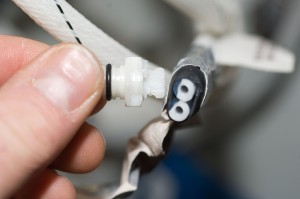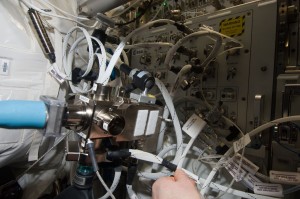The protocol consists of five testing sessions, scheduled over a 24-hour time period. Cardiac output is measured on the ISS using the ‘Pulmonary Function System’. Over the 24-hour period, blood pressure is monitored hourly by an automatic portable device worn on the upper arm, and all urine voids are collected. A blood draw is conducted towards the end of the measurement period to assess hormonal changes.
When André was in the middle of his first cardiac output measurement with the Pulmonary Function System, the hose connector for the breathing gas broke – a big problem, because the gas supply is crucial for the measurements.
The ground teams at DAMEC User Support and Operations Centre (USOC) in Denmark and in Mission Control reported that they had good data for the first of the five measurements, but they might not get repairs completed on orbit in time for the second of the five measurements some four hours later. Hence the teams had to make the difficult decision to abort all the CARD measurements for that day. That way they could make sure that consumables – such as mouth pieces, electrodes and wipes – could be saved for a possible repetition later, providing they could find a way to carry out repairs on-orbit…..
No spare connector of this type was available on-board, but André came across some connectors which were not exactly the same, but somehow similar. With his suggestion, the ground teams went off and tried to prepare a repair for him to transform the connector André found and to make it work for the connection needed for the CARD experiment. The clock was ticking, as André’s samples were planned to return to Earth at the end of April and the repair and all CARD measurements would need replanning.Some days later, the ground teams were ready and had a video prepared to show André how to do this repair. The video message was sent up to him and André succeeded in repairing the connector. Execution of the science protocol was re-planned for mid of April, where this time all five measurements sessions with the Pulmonary Function System were successfully completed by André.
In the meantime, the CARD science team received the in-flight data and collected the frozen urine and blood samples, which were returned to ground with the Soyuz vehicle at the end of April. The science team confirmed the in-flight data and samples look good. Since André was the very last subject for this experiment, this thrilling story now successfully concludes all in-flight measurements and operations for the eight CARD experiment subjects. All’s well that ends well, right?



Discussion: no comments